Organisational Behaviour: Culture, Power, Motivation in A David
VerifiedAdded on 2020/06/05
|14
|4347
|58
Report
AI Summary
This report provides a comprehensive analysis of organisational behaviour within the context of A David & Co Ltd, examining the influences of organisational culture, politics, and power on individual and team performance. It delves into content and process theories of motivation, highlighting motivational techniques and their impact on employee effectiveness. The report differentiates between effective and ineffective teams, outlining key characteristics and behaviours. Furthermore, it explores the philosophies and concepts of organisational behaviour, incorporating contingency theory to address various situational contexts. The analysis covers topics like power cultures, role cultures, task cultures, and person cultures, along with the impact of workplace politics on employee attitudes and productivity. Motivational theories such as Maslow's hierarchy of needs, Alderfer's ERG theory, Vroom's expectancy theory, Adam's equity theory, and Locke's goal-setting theory are discussed, alongside motivational techniques like rewards, challenging work, and supportive feedback. The report concludes by emphasising the importance of emotional intelligence and soft skills in achieving organisational goals.
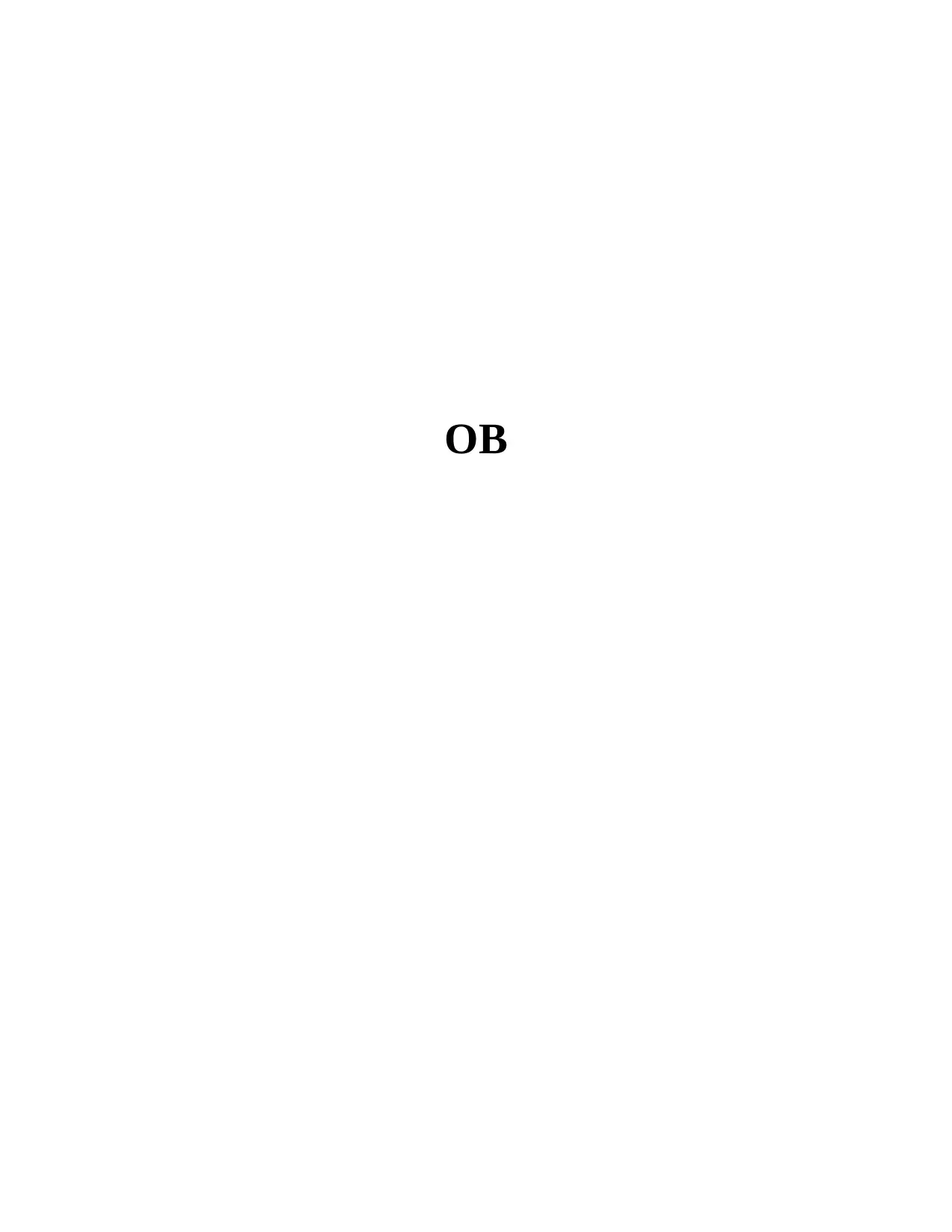
OB
Paraphrase This Document
Need a fresh take? Get an instant paraphrase of this document with our AI Paraphraser
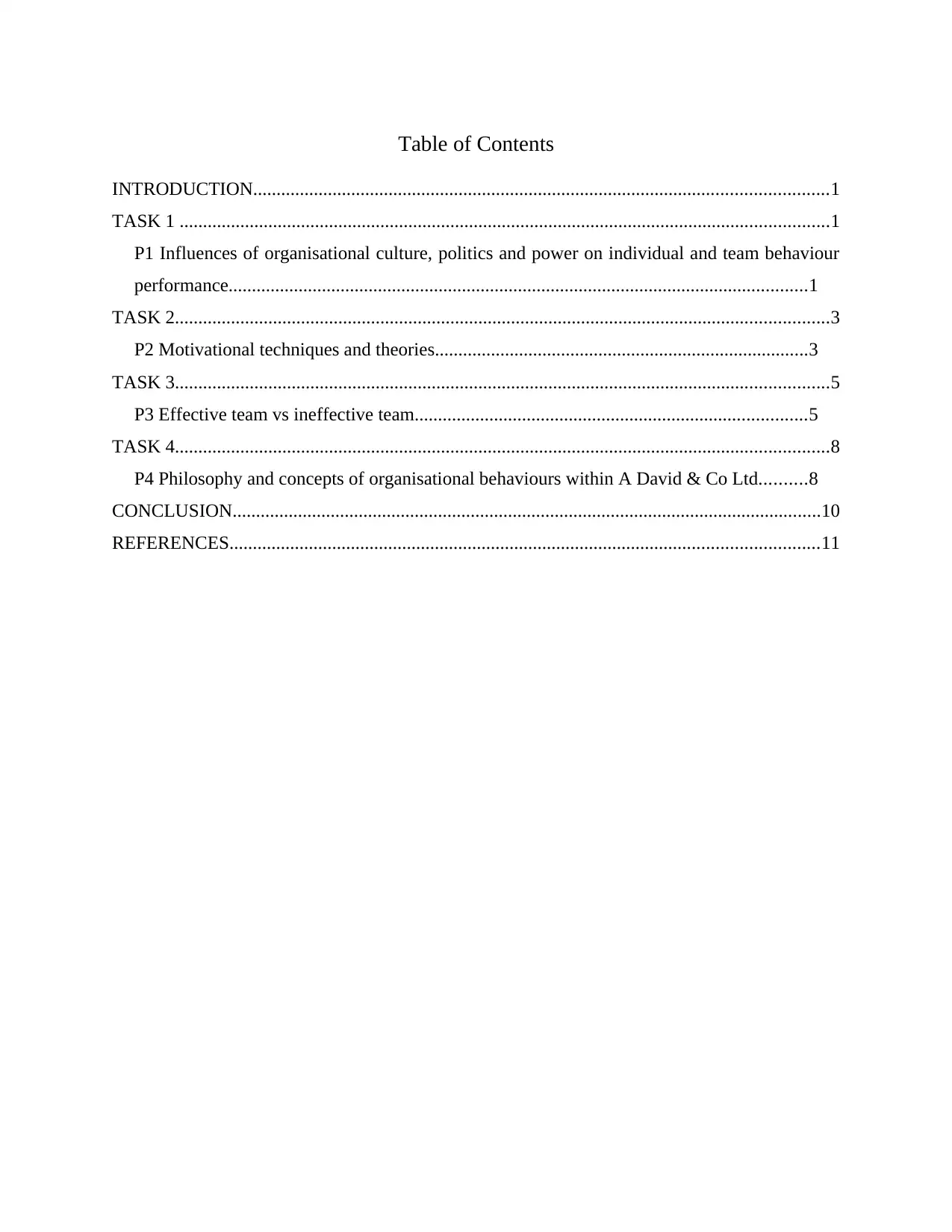
Table of Contents
INTRODUCTION...........................................................................................................................1
TASK 1 ...........................................................................................................................................1
P1 Influences of organisational culture, politics and power on individual and team behaviour
performance............................................................................................................................1
TASK 2............................................................................................................................................3
P2 Motivational techniques and theories................................................................................3
TASK 3............................................................................................................................................5
P3 Effective team vs ineffective team....................................................................................5
TASK 4............................................................................................................................................8
P4 Philosophy and concepts of organisational behaviours within A David & Co Ltd..........8
CONCLUSION..............................................................................................................................10
REFERENCES..............................................................................................................................11
INTRODUCTION...........................................................................................................................1
TASK 1 ...........................................................................................................................................1
P1 Influences of organisational culture, politics and power on individual and team behaviour
performance............................................................................................................................1
TASK 2............................................................................................................................................3
P2 Motivational techniques and theories................................................................................3
TASK 3............................................................................................................................................5
P3 Effective team vs ineffective team....................................................................................5
TASK 4............................................................................................................................................8
P4 Philosophy and concepts of organisational behaviours within A David & Co Ltd..........8
CONCLUSION..............................................................................................................................10
REFERENCES..............................................................................................................................11
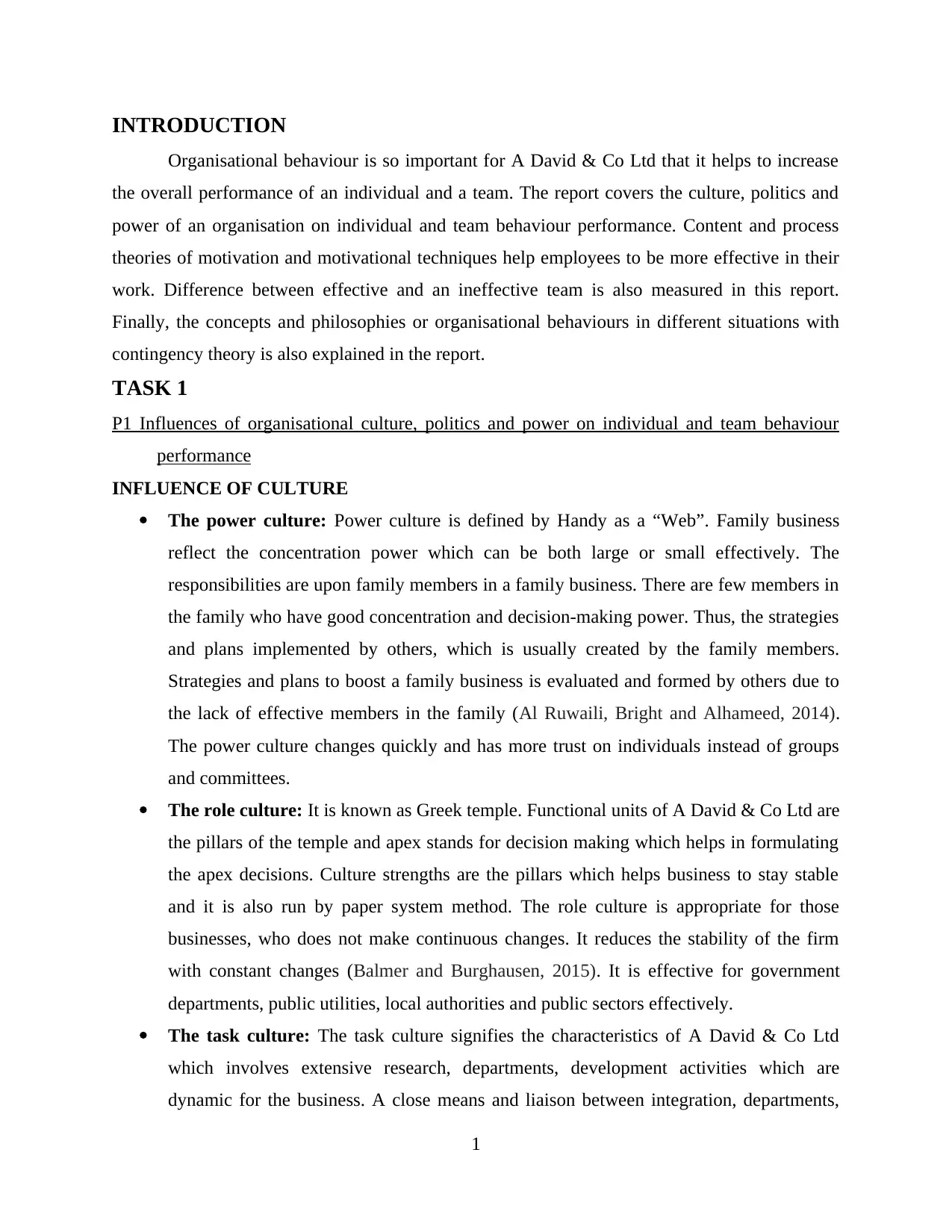
INTRODUCTION
Organisational behaviour is so important for A David & Co Ltd that it helps to increase
the overall performance of an individual and a team. The report covers the culture, politics and
power of an organisation on individual and team behaviour performance. Content and process
theories of motivation and motivational techniques help employees to be more effective in their
work. Difference between effective and an ineffective team is also measured in this report.
Finally, the concepts and philosophies or organisational behaviours in different situations with
contingency theory is also explained in the report.
TASK 1
P1 Influences of organisational culture, politics and power on individual and team behaviour
performance
INFLUENCE OF CULTURE
The power culture: Power culture is defined by Handy as a “Web”. Family business
reflect the concentration power which can be both large or small effectively. The
responsibilities are upon family members in a family business. There are few members in
the family who have good concentration and decision-making power. Thus, the strategies
and plans implemented by others, which is usually created by the family members.
Strategies and plans to boost a family business is evaluated and formed by others due to
the lack of effective members in the family (Al Ruwaili, Bright and Alhameed, 2014).
The power culture changes quickly and has more trust on individuals instead of groups
and committees.
The role culture: It is known as Greek temple. Functional units of A David & Co Ltd are
the pillars of the temple and apex stands for decision making which helps in formulating
the apex decisions. Culture strengths are the pillars which helps business to stay stable
and it is also run by paper system method. The role culture is appropriate for those
businesses, who does not make continuous changes. It reduces the stability of the firm
with constant changes (Balmer and Burghausen, 2015). It is effective for government
departments, public utilities, local authorities and public sectors effectively.
The task culture: The task culture signifies the characteristics of A David & Co Ltd
which involves extensive research, departments, development activities which are
dynamic for the business. A close means and liaison between integration, departments,
1
Organisational behaviour is so important for A David & Co Ltd that it helps to increase
the overall performance of an individual and a team. The report covers the culture, politics and
power of an organisation on individual and team behaviour performance. Content and process
theories of motivation and motivational techniques help employees to be more effective in their
work. Difference between effective and an ineffective team is also measured in this report.
Finally, the concepts and philosophies or organisational behaviours in different situations with
contingency theory is also explained in the report.
TASK 1
P1 Influences of organisational culture, politics and power on individual and team behaviour
performance
INFLUENCE OF CULTURE
The power culture: Power culture is defined by Handy as a “Web”. Family business
reflect the concentration power which can be both large or small effectively. The
responsibilities are upon family members in a family business. There are few members in
the family who have good concentration and decision-making power. Thus, the strategies
and plans implemented by others, which is usually created by the family members.
Strategies and plans to boost a family business is evaluated and formed by others due to
the lack of effective members in the family (Al Ruwaili, Bright and Alhameed, 2014).
The power culture changes quickly and has more trust on individuals instead of groups
and committees.
The role culture: It is known as Greek temple. Functional units of A David & Co Ltd are
the pillars of the temple and apex stands for decision making which helps in formulating
the apex decisions. Culture strengths are the pillars which helps business to stay stable
and it is also run by paper system method. The role culture is appropriate for those
businesses, who does not make continuous changes. It reduces the stability of the firm
with constant changes (Balmer and Burghausen, 2015). It is effective for government
departments, public utilities, local authorities and public sectors effectively.
The task culture: The task culture signifies the characteristics of A David & Co Ltd
which involves extensive research, departments, development activities which are
dynamic for the business. A close means and liaison between integration, departments,
1
⊘ This is a preview!⊘
Do you want full access?
Subscribe today to unlock all pages.

Trusted by 1+ million students worldwide

functions, communication, specialities, business activities and liaison, where A David &
Co Ltd adopt the quick and regular changes and become a part of anticipation efficiently
and effectively. It also influences the performance and decision making of an individual
or team in both negative and positive terms (Banerjee, 2016).
The person culture: The person culture is a part of the structure of management
consensus, where the discovery of structure and paths within individual is chased by A
David & Co Ltd. A formalisation of any structure needs services and requirements of an
individual (Botha and Mostert, 2014). Management control and relationship reporting
describes the person culture appropriate for the groups and communities. It is not suitable
for A David & Co Ltd that it reflects the person culture within the business.
INFLUENCE OF POLITICS
Decrease production: Changes in politics affect the outputs produces by an individual
and also decrease the production and profitability of A David & Co Ltd. Workers plays
politics at workplace lose their attention towards their specific task. It also affects other
employees negatively within the business. These employees pay their attention towards
back biting and leg pulling (Chen and Lai 2014).
Change attitudes and demotivate employees: Politics at workplace demotivate
employees that they are no longer able to work hard in their tasks, which also affect their
rewards effectively. Politics also affects some skilled and knowledgeable employees that
they lose their concentration and become lazy towards work and attend office just for
sake. Hard work from employees also goes unnoticed, in the presence of politics in A
David & Co Ltd.
Wrong information and stress: Politics affect the employees as they find more
problems to communicate their information with each other due to the fear of leaking
secrets and data. They do not trust each other as they feel more tensed and stressed.
Management also get wrong information about business activities. Thus, this affects the
individual and team behaviour effectively (Diedericks and Rothmann 2014).
INFLUENCE OF POWER
Power is an authority which is given by A David & Co Ltd to their managers and leaders
to control the business activities and performances of employees towards their task in a specific
time. Power effect is used in both small and big organisation to influence the employees power,
2
Co Ltd adopt the quick and regular changes and become a part of anticipation efficiently
and effectively. It also influences the performance and decision making of an individual
or team in both negative and positive terms (Banerjee, 2016).
The person culture: The person culture is a part of the structure of management
consensus, where the discovery of structure and paths within individual is chased by A
David & Co Ltd. A formalisation of any structure needs services and requirements of an
individual (Botha and Mostert, 2014). Management control and relationship reporting
describes the person culture appropriate for the groups and communities. It is not suitable
for A David & Co Ltd that it reflects the person culture within the business.
INFLUENCE OF POLITICS
Decrease production: Changes in politics affect the outputs produces by an individual
and also decrease the production and profitability of A David & Co Ltd. Workers plays
politics at workplace lose their attention towards their specific task. It also affects other
employees negatively within the business. These employees pay their attention towards
back biting and leg pulling (Chen and Lai 2014).
Change attitudes and demotivate employees: Politics at workplace demotivate
employees that they are no longer able to work hard in their tasks, which also affect their
rewards effectively. Politics also affects some skilled and knowledgeable employees that
they lose their concentration and become lazy towards work and attend office just for
sake. Hard work from employees also goes unnoticed, in the presence of politics in A
David & Co Ltd.
Wrong information and stress: Politics affect the employees as they find more
problems to communicate their information with each other due to the fear of leaking
secrets and data. They do not trust each other as they feel more tensed and stressed.
Management also get wrong information about business activities. Thus, this affects the
individual and team behaviour effectively (Diedericks and Rothmann 2014).
INFLUENCE OF POWER
Power is an authority which is given by A David & Co Ltd to their managers and leaders
to control the business activities and performances of employees towards their task in a specific
time. Power effect is used in both small and big organisation to influence the employees power,
2
Paraphrase This Document
Need a fresh take? Get an instant paraphrase of this document with our AI Paraphraser
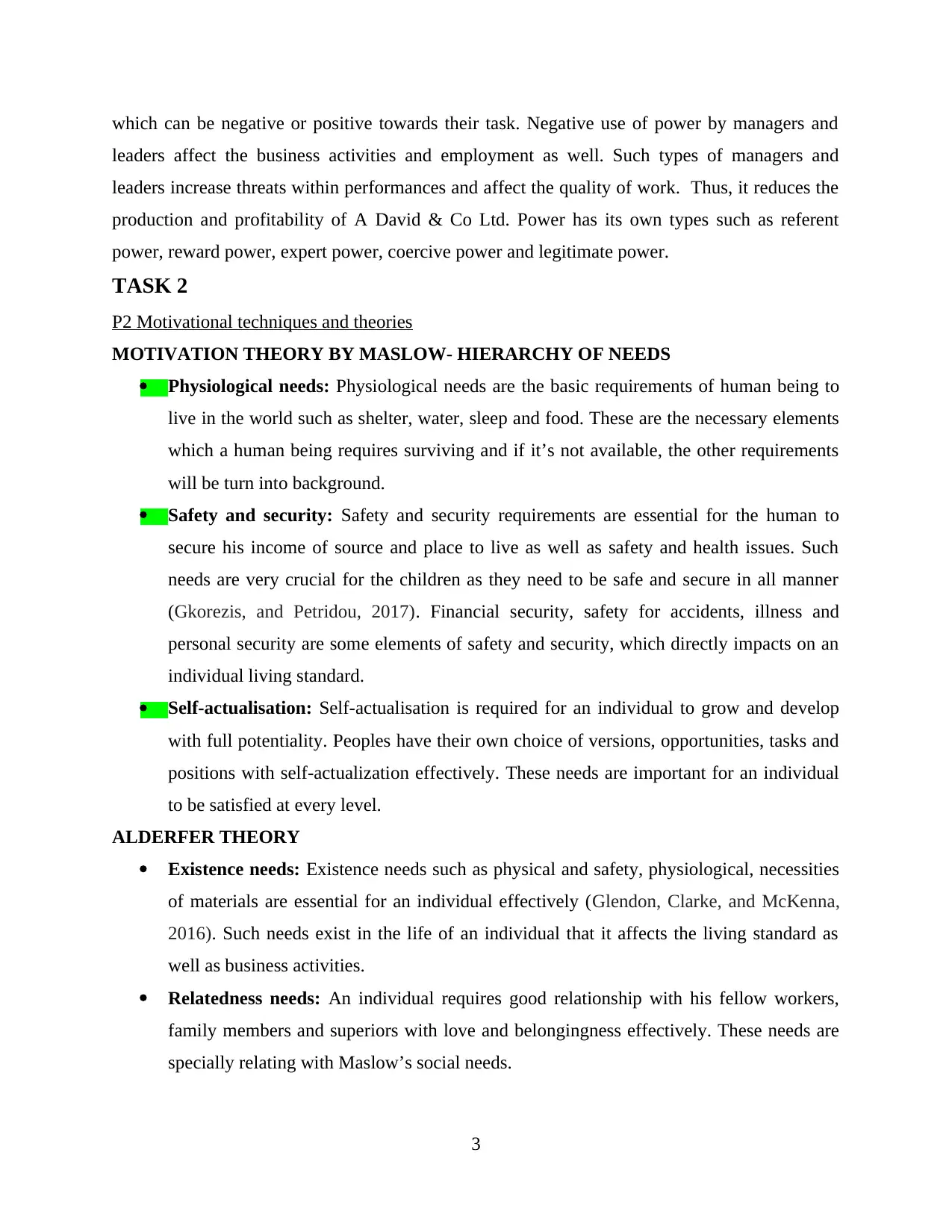
which can be negative or positive towards their task. Negative use of power by managers and
leaders affect the business activities and employment as well. Such types of managers and
leaders increase threats within performances and affect the quality of work. Thus, it reduces the
production and profitability of A David & Co Ltd. Power has its own types such as referent
power, reward power, expert power, coercive power and legitimate power.
TASK 2
P2 Motivational techniques and theories
MOTIVATION THEORY BY MASLOW- HIERARCHY OF NEEDS
Physiological needs: Physiological needs are the basic requirements of human being to
live in the world such as shelter, water, sleep and food. These are the necessary elements
which a human being requires surviving and if it’s not available, the other requirements
will be turn into background.
Safety and security: Safety and security requirements are essential for the human to
secure his income of source and place to live as well as safety and health issues. Such
needs are very crucial for the children as they need to be safe and secure in all manner
(Gkorezis, and Petridou, 2017). Financial security, safety for accidents, illness and
personal security are some elements of safety and security, which directly impacts on an
individual living standard.
Self-actualisation: Self-actualisation is required for an individual to grow and develop
with full potentiality. Peoples have their own choice of versions, opportunities, tasks and
positions with self-actualization effectively. These needs are important for an individual
to be satisfied at every level.
ALDERFER THEORY
Existence needs: Existence needs such as physical and safety, physiological, necessities
of materials are essential for an individual effectively (Glendon, Clarke, and McKenna,
2016). Such needs exist in the life of an individual that it affects the living standard as
well as business activities.
Relatedness needs: An individual requires good relationship with his fellow workers,
family members and superiors with love and belongingness effectively. These needs are
specially relating with Maslow’s social needs.
3
leaders affect the business activities and employment as well. Such types of managers and
leaders increase threats within performances and affect the quality of work. Thus, it reduces the
production and profitability of A David & Co Ltd. Power has its own types such as referent
power, reward power, expert power, coercive power and legitimate power.
TASK 2
P2 Motivational techniques and theories
MOTIVATION THEORY BY MASLOW- HIERARCHY OF NEEDS
Physiological needs: Physiological needs are the basic requirements of human being to
live in the world such as shelter, water, sleep and food. These are the necessary elements
which a human being requires surviving and if it’s not available, the other requirements
will be turn into background.
Safety and security: Safety and security requirements are essential for the human to
secure his income of source and place to live as well as safety and health issues. Such
needs are very crucial for the children as they need to be safe and secure in all manner
(Gkorezis, and Petridou, 2017). Financial security, safety for accidents, illness and
personal security are some elements of safety and security, which directly impacts on an
individual living standard.
Self-actualisation: Self-actualisation is required for an individual to grow and develop
with full potentiality. Peoples have their own choice of versions, opportunities, tasks and
positions with self-actualization effectively. These needs are important for an individual
to be satisfied at every level.
ALDERFER THEORY
Existence needs: Existence needs such as physical and safety, physiological, necessities
of materials are essential for an individual effectively (Glendon, Clarke, and McKenna,
2016). Such needs exist in the life of an individual that it affects the living standard as
well as business activities.
Relatedness needs: An individual requires good relationship with his fellow workers,
family members and superiors with love and belongingness effectively. These needs are
specially relating with Maslow’s social needs.
3
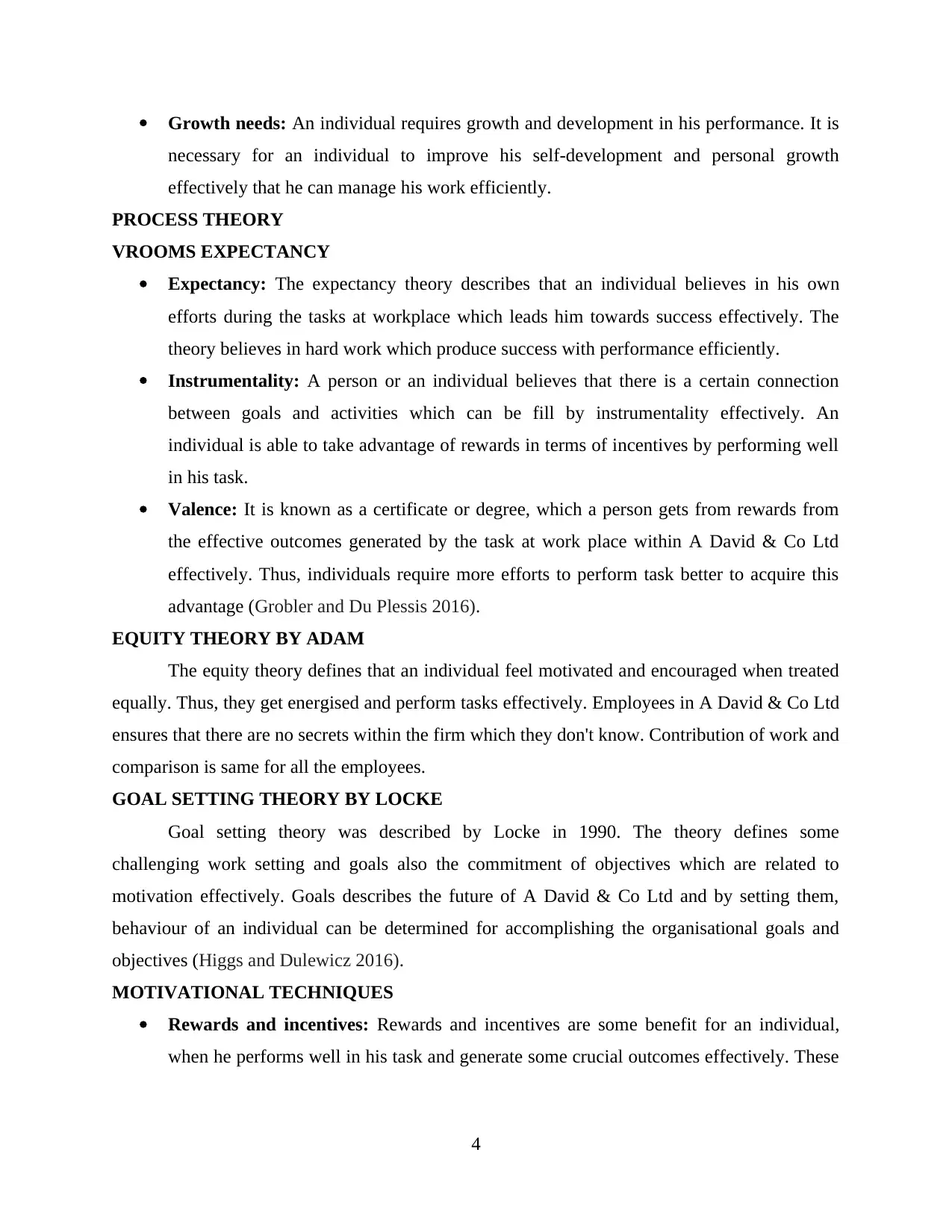
Growth needs: An individual requires growth and development in his performance. It is
necessary for an individual to improve his self-development and personal growth
effectively that he can manage his work efficiently.
PROCESS THEORY
VROOMS EXPECTANCY
Expectancy: The expectancy theory describes that an individual believes in his own
efforts during the tasks at workplace which leads him towards success effectively. The
theory believes in hard work which produce success with performance efficiently.
Instrumentality: A person or an individual believes that there is a certain connection
between goals and activities which can be fill by instrumentality effectively. An
individual is able to take advantage of rewards in terms of incentives by performing well
in his task.
Valence: It is known as a certificate or degree, which a person gets from rewards from
the effective outcomes generated by the task at work place within A David & Co Ltd
effectively. Thus, individuals require more efforts to perform task better to acquire this
advantage (Grobler and Du Plessis 2016).
EQUITY THEORY BY ADAM
The equity theory defines that an individual feel motivated and encouraged when treated
equally. Thus, they get energised and perform tasks effectively. Employees in A David & Co Ltd
ensures that there are no secrets within the firm which they don't know. Contribution of work and
comparison is same for all the employees.
GOAL SETTING THEORY BY LOCKE
Goal setting theory was described by Locke in 1990. The theory defines some
challenging work setting and goals also the commitment of objectives which are related to
motivation effectively. Goals describes the future of A David & Co Ltd and by setting them,
behaviour of an individual can be determined for accomplishing the organisational goals and
objectives (Higgs and Dulewicz 2016).
MOTIVATIONAL TECHNIQUES
Rewards and incentives: Rewards and incentives are some benefit for an individual,
when he performs well in his task and generate some crucial outcomes effectively. These
4
necessary for an individual to improve his self-development and personal growth
effectively that he can manage his work efficiently.
PROCESS THEORY
VROOMS EXPECTANCY
Expectancy: The expectancy theory describes that an individual believes in his own
efforts during the tasks at workplace which leads him towards success effectively. The
theory believes in hard work which produce success with performance efficiently.
Instrumentality: A person or an individual believes that there is a certain connection
between goals and activities which can be fill by instrumentality effectively. An
individual is able to take advantage of rewards in terms of incentives by performing well
in his task.
Valence: It is known as a certificate or degree, which a person gets from rewards from
the effective outcomes generated by the task at work place within A David & Co Ltd
effectively. Thus, individuals require more efforts to perform task better to acquire this
advantage (Grobler and Du Plessis 2016).
EQUITY THEORY BY ADAM
The equity theory defines that an individual feel motivated and encouraged when treated
equally. Thus, they get energised and perform tasks effectively. Employees in A David & Co Ltd
ensures that there are no secrets within the firm which they don't know. Contribution of work and
comparison is same for all the employees.
GOAL SETTING THEORY BY LOCKE
Goal setting theory was described by Locke in 1990. The theory defines some
challenging work setting and goals also the commitment of objectives which are related to
motivation effectively. Goals describes the future of A David & Co Ltd and by setting them,
behaviour of an individual can be determined for accomplishing the organisational goals and
objectives (Higgs and Dulewicz 2016).
MOTIVATIONAL TECHNIQUES
Rewards and incentives: Rewards and incentives are some benefit for an individual,
when he performs well in his task and generate some crucial outcomes effectively. These
4
⊘ This is a preview!⊘
Do you want full access?
Subscribe today to unlock all pages.

Trusted by 1+ million students worldwide

are the extra benefits for an individual which he gets by completing his goals and
objectives, which also drive his performance and increase potentiality.
Meaningful and challenging work: Employees in the firm feels motivated when they
know the importance of task. Challenges made them perfect and ambitious towards their
work which produce more productivity and profitability for A David & Co Ltd. Such
types of meaningful and challenging works also increase the capability and ability of an
individual that he can perform the task effectively.
Supportive feedbacks: Positive feedbacks from the mangers and leaders motivates an
employee to work hard and drive his performance. This will help them to increase their
skills, behaviours and potentiality effectively (Jha, 2014). Thus, the employees feel
motivated and generate some positive outcomes, which helps A David & Co Ltd to
achieve its objectives and goals effectively.
EMOTIONAL INTELLIGENCE
Emotional intelligence describes the individual capacity to acquire knowledge from his
own emotions. Emotional information guide thinking and behaviours to control the emotions
according to A David & Co Ltd work place environment to achieve the objectives and goals
effectively.
SOFT SKILL IMPORTANCE
Soft skills such as attitudes, good habits, personality traits and behaviour, which helps
managers and an individual to achieve its targets and objectives effectively. This will help them
to manage their tasks well and also dependability, communication, team work, candour and
mental agility. Thus, it will help A David & Co Ltd to accomplish its desired goals and
objectives (Lozano, Ceulemans and Seatter 2015).
TASK 3
P3 Effective team vs ineffective team
Team members in an effective team discuss those points on which they are not agreed.
This will motivate them to face different situations to present new thoughts and ideas to reach
their consensus. Effective team work collaboratively to improve their skills and knowledge to
accomplish objectives and goals effectively. Here are some characteristics of an effective team
discussed below:
5
objectives, which also drive his performance and increase potentiality.
Meaningful and challenging work: Employees in the firm feels motivated when they
know the importance of task. Challenges made them perfect and ambitious towards their
work which produce more productivity and profitability for A David & Co Ltd. Such
types of meaningful and challenging works also increase the capability and ability of an
individual that he can perform the task effectively.
Supportive feedbacks: Positive feedbacks from the mangers and leaders motivates an
employee to work hard and drive his performance. This will help them to increase their
skills, behaviours and potentiality effectively (Jha, 2014). Thus, the employees feel
motivated and generate some positive outcomes, which helps A David & Co Ltd to
achieve its objectives and goals effectively.
EMOTIONAL INTELLIGENCE
Emotional intelligence describes the individual capacity to acquire knowledge from his
own emotions. Emotional information guide thinking and behaviours to control the emotions
according to A David & Co Ltd work place environment to achieve the objectives and goals
effectively.
SOFT SKILL IMPORTANCE
Soft skills such as attitudes, good habits, personality traits and behaviour, which helps
managers and an individual to achieve its targets and objectives effectively. This will help them
to manage their tasks well and also dependability, communication, team work, candour and
mental agility. Thus, it will help A David & Co Ltd to accomplish its desired goals and
objectives (Lozano, Ceulemans and Seatter 2015).
TASK 3
P3 Effective team vs ineffective team
Team members in an effective team discuss those points on which they are not agreed.
This will motivate them to face different situations to present new thoughts and ideas to reach
their consensus. Effective team work collaboratively to improve their skills and knowledge to
accomplish objectives and goals effectively. Here are some characteristics of an effective team
discussed below:
5
Paraphrase This Document
Need a fresh take? Get an instant paraphrase of this document with our AI Paraphraser

Use of situational leadership: Leaders in an effective team use the situational leadership
style or approach by leading employees in the team for different situations and
circumstances. Leaders are able to achieve their individual and organisational goals with
use of situational leadership approach within A David & Co Ltd. Effective team make
their own changes according to the situations, which helps them to improve and develop
their performance and skills effectively.
Open discussion: Open discussion includes participation of members from an effective
team to discuss and communicate their ideas and thoughts effectively (Lukoto, and Chan,
2016). Members in an effective team contributes their efforts towards discussions and
also get prepare for listening and learning activities. Such types of discussions help team
members to be more effective for a particular task, which also help them to accomplish
their common goals and objectives to increase the profitability and productivity
effectively.
Rather, an ineffective team try to solve their problems with ideas and communications
with making an overview of it. An ineffective team has no proper goals to achieve and also the
environment is full of tensions that they nobody is able to make appropriate solutions of the
problems. Team members are lazy towards their work and also dependent on each other.
BASIS EFFECTIVE TEAM INEFFECTIVE TEAM
UNDERSTANDING
THE GOALS
Team members in an effective team
aware of their individual goals and
objectives.
Members in the team find
difficulties to understand their
objectives.
MEMBERS
CONTRIBUTION
Members contributes their efforts
towards tasks and also participate
in organisational activities.
Only few members in the team
participates and also lazy towards
their work.
COLLABORATION
AND LISTENING
Team members listen to each other
and also work collaboratively to
achieve their common goals and
objectives.
Members fails to listen each other
which cause problems and also fail
to perform better in tasks.
CONFLICTS
RESOLUTION
Team members communicate well
with each other so that the conflicts
Members create unnecessary
issues that they are unable to solve
6
style or approach by leading employees in the team for different situations and
circumstances. Leaders are able to achieve their individual and organisational goals with
use of situational leadership approach within A David & Co Ltd. Effective team make
their own changes according to the situations, which helps them to improve and develop
their performance and skills effectively.
Open discussion: Open discussion includes participation of members from an effective
team to discuss and communicate their ideas and thoughts effectively (Lukoto, and Chan,
2016). Members in an effective team contributes their efforts towards discussions and
also get prepare for listening and learning activities. Such types of discussions help team
members to be more effective for a particular task, which also help them to accomplish
their common goals and objectives to increase the profitability and productivity
effectively.
Rather, an ineffective team try to solve their problems with ideas and communications
with making an overview of it. An ineffective team has no proper goals to achieve and also the
environment is full of tensions that they nobody is able to make appropriate solutions of the
problems. Team members are lazy towards their work and also dependent on each other.
BASIS EFFECTIVE TEAM INEFFECTIVE TEAM
UNDERSTANDING
THE GOALS
Team members in an effective team
aware of their individual goals and
objectives.
Members in the team find
difficulties to understand their
objectives.
MEMBERS
CONTRIBUTION
Members contributes their efforts
towards tasks and also participate
in organisational activities.
Only few members in the team
participates and also lazy towards
their work.
COLLABORATION
AND LISTENING
Team members listen to each other
and also work collaboratively to
achieve their common goals and
objectives.
Members fails to listen each other
which cause problems and also fail
to perform better in tasks.
CONFLICTS
RESOLUTION
Team members communicate well
with each other so that the conflicts
Members create unnecessary
issues that they are unable to solve
6
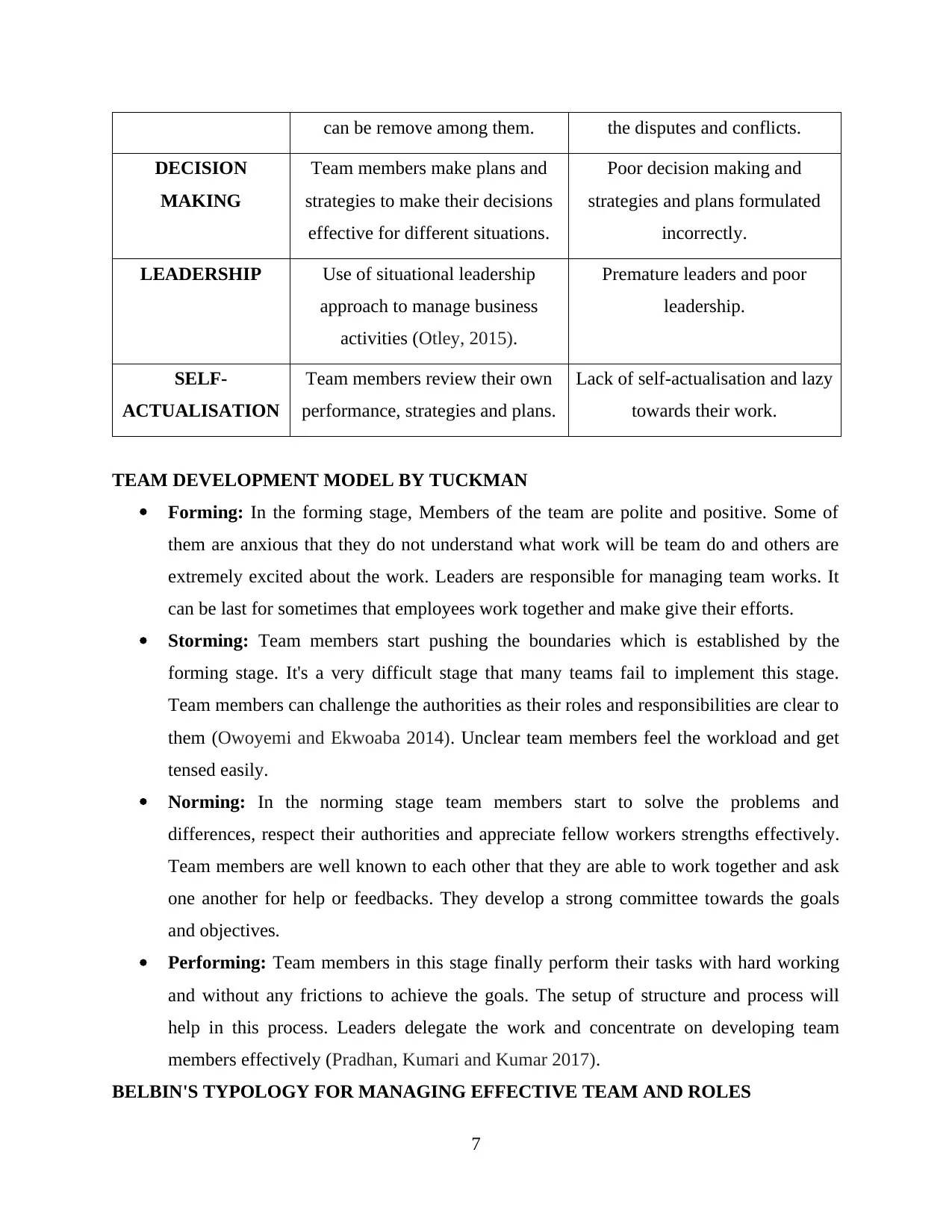
can be remove among them. the disputes and conflicts.
DECISION
MAKING
Team members make plans and
strategies to make their decisions
effective for different situations.
Poor decision making and
strategies and plans formulated
incorrectly.
LEADERSHIP Use of situational leadership
approach to manage business
activities (Otley, 2015).
Premature leaders and poor
leadership.
SELF-
ACTUALISATION
Team members review their own
performance, strategies and plans.
Lack of self-actualisation and lazy
towards their work.
TEAM DEVELOPMENT MODEL BY TUCKMAN
Forming: In the forming stage, Members of the team are polite and positive. Some of
them are anxious that they do not understand what work will be team do and others are
extremely excited about the work. Leaders are responsible for managing team works. It
can be last for sometimes that employees work together and make give their efforts.
Storming: Team members start pushing the boundaries which is established by the
forming stage. It's a very difficult stage that many teams fail to implement this stage.
Team members can challenge the authorities as their roles and responsibilities are clear to
them (Owoyemi and Ekwoaba 2014). Unclear team members feel the workload and get
tensed easily.
Norming: In the norming stage team members start to solve the problems and
differences, respect their authorities and appreciate fellow workers strengths effectively.
Team members are well known to each other that they are able to work together and ask
one another for help or feedbacks. They develop a strong committee towards the goals
and objectives.
Performing: Team members in this stage finally perform their tasks with hard working
and without any frictions to achieve the goals. The setup of structure and process will
help in this process. Leaders delegate the work and concentrate on developing team
members effectively (Pradhan, Kumari and Kumar 2017).
BELBIN'S TYPOLOGY FOR MANAGING EFFECTIVE TEAM AND ROLES
7
DECISION
MAKING
Team members make plans and
strategies to make their decisions
effective for different situations.
Poor decision making and
strategies and plans formulated
incorrectly.
LEADERSHIP Use of situational leadership
approach to manage business
activities (Otley, 2015).
Premature leaders and poor
leadership.
SELF-
ACTUALISATION
Team members review their own
performance, strategies and plans.
Lack of self-actualisation and lazy
towards their work.
TEAM DEVELOPMENT MODEL BY TUCKMAN
Forming: In the forming stage, Members of the team are polite and positive. Some of
them are anxious that they do not understand what work will be team do and others are
extremely excited about the work. Leaders are responsible for managing team works. It
can be last for sometimes that employees work together and make give their efforts.
Storming: Team members start pushing the boundaries which is established by the
forming stage. It's a very difficult stage that many teams fail to implement this stage.
Team members can challenge the authorities as their roles and responsibilities are clear to
them (Owoyemi and Ekwoaba 2014). Unclear team members feel the workload and get
tensed easily.
Norming: In the norming stage team members start to solve the problems and
differences, respect their authorities and appreciate fellow workers strengths effectively.
Team members are well known to each other that they are able to work together and ask
one another for help or feedbacks. They develop a strong committee towards the goals
and objectives.
Performing: Team members in this stage finally perform their tasks with hard working
and without any frictions to achieve the goals. The setup of structure and process will
help in this process. Leaders delegate the work and concentrate on developing team
members effectively (Pradhan, Kumari and Kumar 2017).
BELBIN'S TYPOLOGY FOR MANAGING EFFECTIVE TEAM AND ROLES
7
⊘ This is a preview!⊘
Do you want full access?
Subscribe today to unlock all pages.

Trusted by 1+ million students worldwide
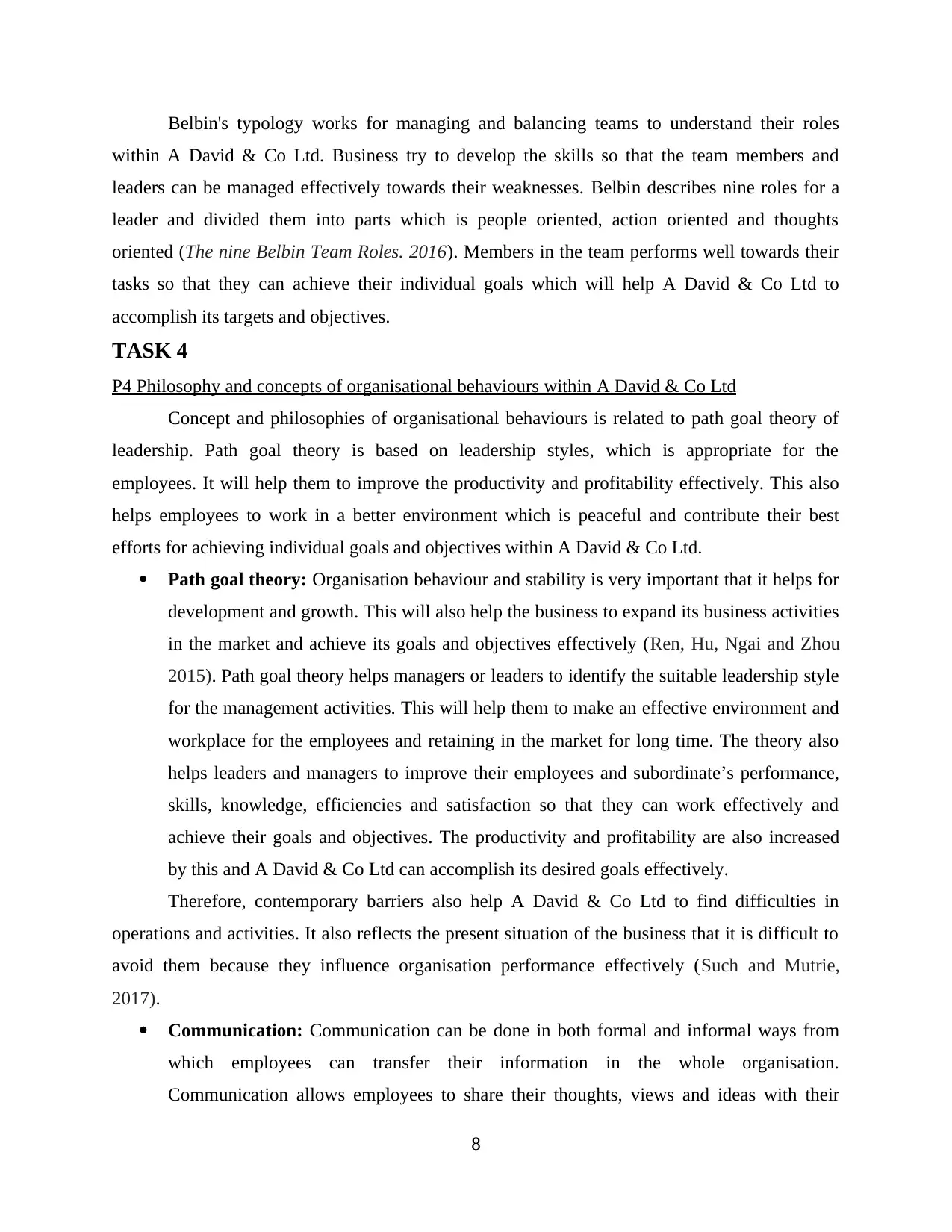
Belbin's typology works for managing and balancing teams to understand their roles
within A David & Co Ltd. Business try to develop the skills so that the team members and
leaders can be managed effectively towards their weaknesses. Belbin describes nine roles for a
leader and divided them into parts which is people oriented, action oriented and thoughts
oriented (The nine Belbin Team Roles. 2016). Members in the team performs well towards their
tasks so that they can achieve their individual goals which will help A David & Co Ltd to
accomplish its targets and objectives.
TASK 4
P4 Philosophy and concepts of organisational behaviours within A David & Co Ltd
Concept and philosophies of organisational behaviours is related to path goal theory of
leadership. Path goal theory is based on leadership styles, which is appropriate for the
employees. It will help them to improve the productivity and profitability effectively. This also
helps employees to work in a better environment which is peaceful and contribute their best
efforts for achieving individual goals and objectives within A David & Co Ltd.
Path goal theory: Organisation behaviour and stability is very important that it helps for
development and growth. This will also help the business to expand its business activities
in the market and achieve its goals and objectives effectively (Ren, Hu, Ngai and Zhou
2015). Path goal theory helps managers or leaders to identify the suitable leadership style
for the management activities. This will help them to make an effective environment and
workplace for the employees and retaining in the market for long time. The theory also
helps leaders and managers to improve their employees and subordinate’s performance,
skills, knowledge, efficiencies and satisfaction so that they can work effectively and
achieve their goals and objectives. The productivity and profitability are also increased
by this and A David & Co Ltd can accomplish its desired goals effectively.
Therefore, contemporary barriers also help A David & Co Ltd to find difficulties in
operations and activities. It also reflects the present situation of the business that it is difficult to
avoid them because they influence organisation performance effectively (Such and Mutrie,
2017).
Communication: Communication can be done in both formal and informal ways from
which employees can transfer their information in the whole organisation.
Communication allows employees to share their thoughts, views and ideas with their
8
within A David & Co Ltd. Business try to develop the skills so that the team members and
leaders can be managed effectively towards their weaknesses. Belbin describes nine roles for a
leader and divided them into parts which is people oriented, action oriented and thoughts
oriented (The nine Belbin Team Roles. 2016). Members in the team performs well towards their
tasks so that they can achieve their individual goals which will help A David & Co Ltd to
accomplish its targets and objectives.
TASK 4
P4 Philosophy and concepts of organisational behaviours within A David & Co Ltd
Concept and philosophies of organisational behaviours is related to path goal theory of
leadership. Path goal theory is based on leadership styles, which is appropriate for the
employees. It will help them to improve the productivity and profitability effectively. This also
helps employees to work in a better environment which is peaceful and contribute their best
efforts for achieving individual goals and objectives within A David & Co Ltd.
Path goal theory: Organisation behaviour and stability is very important that it helps for
development and growth. This will also help the business to expand its business activities
in the market and achieve its goals and objectives effectively (Ren, Hu, Ngai and Zhou
2015). Path goal theory helps managers or leaders to identify the suitable leadership style
for the management activities. This will help them to make an effective environment and
workplace for the employees and retaining in the market for long time. The theory also
helps leaders and managers to improve their employees and subordinate’s performance,
skills, knowledge, efficiencies and satisfaction so that they can work effectively and
achieve their goals and objectives. The productivity and profitability are also increased
by this and A David & Co Ltd can accomplish its desired goals effectively.
Therefore, contemporary barriers also help A David & Co Ltd to find difficulties in
operations and activities. It also reflects the present situation of the business that it is difficult to
avoid them because they influence organisation performance effectively (Such and Mutrie,
2017).
Communication: Communication can be done in both formal and informal ways from
which employees can transfer their information in the whole organisation.
Communication allows employees to share their thoughts, views and ideas with their
8
Paraphrase This Document
Need a fresh take? Get an instant paraphrase of this document with our AI Paraphraser

fellow workers which will help them to resolve the conflicts and problems effectively. A
David & Co Ltd management faces problem when there is lack of effective
communication between employees.
Behaviour: This helps organisation to find characteristics and belongingness of
employees. Behaviour of an employee decides the relationship with his fellow workers.
Lack of equality will destroy the behaviour of an employee that he is no longer respective
towards his superiors and leaders and also make some unnecessary issue within A David
& Co Ltd (Thatcher, Vasconcelos and Ellis 2015). Positive and effective behaviour help
employees to work hard and manage relationship with others in the firm. This will also
help them to achieve their individual goals and objectives effectively, which also help
organisation to increase its productivity and profitability which leads towards achieving
goals and objectives effectively.
Efficiency level: Level of efficiency is evaluated by the performance of an employee
towards his task. Employees manage their work and responsibilities so that they are able
to develop their individual skills and knowledge. Workers with inefficiencies unable to
perform task better and decrease the productivity and profitability effectively, which is
harmful for A David & Co Ltd (Van Vuuren, Dhurup and Joubert 2016).
CONTINGENCY THEORY
Contingency theory helps organisation to measure business system learnings. Employee
efficiency and effectiveness helps A David & Co Ltd to improve its market position and
structure as well. Some other challenges lead the theory of innovation and shows that they are
fully observed. Other challenges are attended by the innovations to perform well in the process.
Theoretical and methodological innovations help organisation to represent opportunities for the
contingency theory for making a strong structure of the firm (Wan, 2017). Finally, they take
opportunities, advantages and increase the production within A David & Co Ltd. Organisational
behaviour concepts and philosophy affect the business of A David & Co Ltd in both positive and
negative terms effectively and efficiently.
9
David & Co Ltd management faces problem when there is lack of effective
communication between employees.
Behaviour: This helps organisation to find characteristics and belongingness of
employees. Behaviour of an employee decides the relationship with his fellow workers.
Lack of equality will destroy the behaviour of an employee that he is no longer respective
towards his superiors and leaders and also make some unnecessary issue within A David
& Co Ltd (Thatcher, Vasconcelos and Ellis 2015). Positive and effective behaviour help
employees to work hard and manage relationship with others in the firm. This will also
help them to achieve their individual goals and objectives effectively, which also help
organisation to increase its productivity and profitability which leads towards achieving
goals and objectives effectively.
Efficiency level: Level of efficiency is evaluated by the performance of an employee
towards his task. Employees manage their work and responsibilities so that they are able
to develop their individual skills and knowledge. Workers with inefficiencies unable to
perform task better and decrease the productivity and profitability effectively, which is
harmful for A David & Co Ltd (Van Vuuren, Dhurup and Joubert 2016).
CONTINGENCY THEORY
Contingency theory helps organisation to measure business system learnings. Employee
efficiency and effectiveness helps A David & Co Ltd to improve its market position and
structure as well. Some other challenges lead the theory of innovation and shows that they are
fully observed. Other challenges are attended by the innovations to perform well in the process.
Theoretical and methodological innovations help organisation to represent opportunities for the
contingency theory for making a strong structure of the firm (Wan, 2017). Finally, they take
opportunities, advantages and increase the production within A David & Co Ltd. Organisational
behaviour concepts and philosophy affect the business of A David & Co Ltd in both positive and
negative terms effectively and efficiently.
9

CONCLUSION
The report analyses the organisational culture, politics and power which influence the
team behaviour and an individual performance effectively. Different organisations have their
various culture and activities which influence the performance of an individual and team.
Content and process theories of motivation include theories described by Maslow, Herzberg and
Alderfer. Furthermore, process theories are explained by Vroom, Adam and Locke. In addition,
the report explains motivational techniques which helps individuals and teams to achieve their
goals and objectives with motivation. Difference between effective and ineffective team
describes the performance level and working style within A David & Co Ltd. Finally, concepts
and philosophy of organisational behaviour within A David & Co Ltd has been described for
different business situations.
10
The report analyses the organisational culture, politics and power which influence the
team behaviour and an individual performance effectively. Different organisations have their
various culture and activities which influence the performance of an individual and team.
Content and process theories of motivation include theories described by Maslow, Herzberg and
Alderfer. Furthermore, process theories are explained by Vroom, Adam and Locke. In addition,
the report explains motivational techniques which helps individuals and teams to achieve their
goals and objectives with motivation. Difference between effective and ineffective team
describes the performance level and working style within A David & Co Ltd. Finally, concepts
and philosophy of organisational behaviour within A David & Co Ltd has been described for
different business situations.
10
⊘ This is a preview!⊘
Do you want full access?
Subscribe today to unlock all pages.

Trusted by 1+ million students worldwide
1 out of 14
Related Documents
Your All-in-One AI-Powered Toolkit for Academic Success.
+13062052269
info@desklib.com
Available 24*7 on WhatsApp / Email
![[object Object]](/_next/static/media/star-bottom.7253800d.svg)
Unlock your academic potential
Copyright © 2020–2026 A2Z Services. All Rights Reserved. Developed and managed by ZUCOL.




